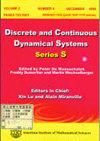自主FDEs的线性稳定性和基本再现数
IF 1
4区 数学
Q2 MATHEMATICS, APPLIED
引用次数: 0
摘要
本文首先证明了一类线性自治合作泛函微分方程(FDE)及其关联的无时滞自治合作系统的稳定性等价性。然后给出了一般自治fde的基本再生数$\mathcal{R}_0$的理论。作为一个示例,我们还建立了基于$\mathcal{R}_0$的延时黑腿蜱种群模型的阈值动力学。本文章由计算机程序翻译,如有差异,请以英文原文为准。
The linear stability and basic reproduction numbers for autonomous FDEs
In this paper, we first prove the stability equivalence between a linear autonomous and cooperative functional differential equation (FDE) and its associated autonomous and cooperative system without time delay. Then we present the theory of basic reproduction number $\mathcal{R}_0$ for general autonomous FDEs. As an illustrative example, we also establish the threshold dynamics for a time-delayed population model of black-legged ticks in terms of $\mathcal{R}_0$.
求助全文
通过发布文献求助,成功后即可免费获取论文全文。
去求助
来源期刊

Discrete and Continuous Dynamical Systems-Series S
MATHEMATICS, APPLIED-
CiteScore
3.70
自引率
5.60%
发文量
177
期刊介绍:
Series S of Discrete and Continuous Dynamical Systems only publishes theme issues. Each issue is devoted to a specific area of the mathematical, physical and engineering sciences. This area will define a research frontier that is advancing rapidly, often bridging mathematics and sciences. DCDS-S is essential reading for mathematicians, physicists, engineers and other physical scientists. The journal is published bimonthly.
 求助内容:
求助内容: 应助结果提醒方式:
应助结果提醒方式:


